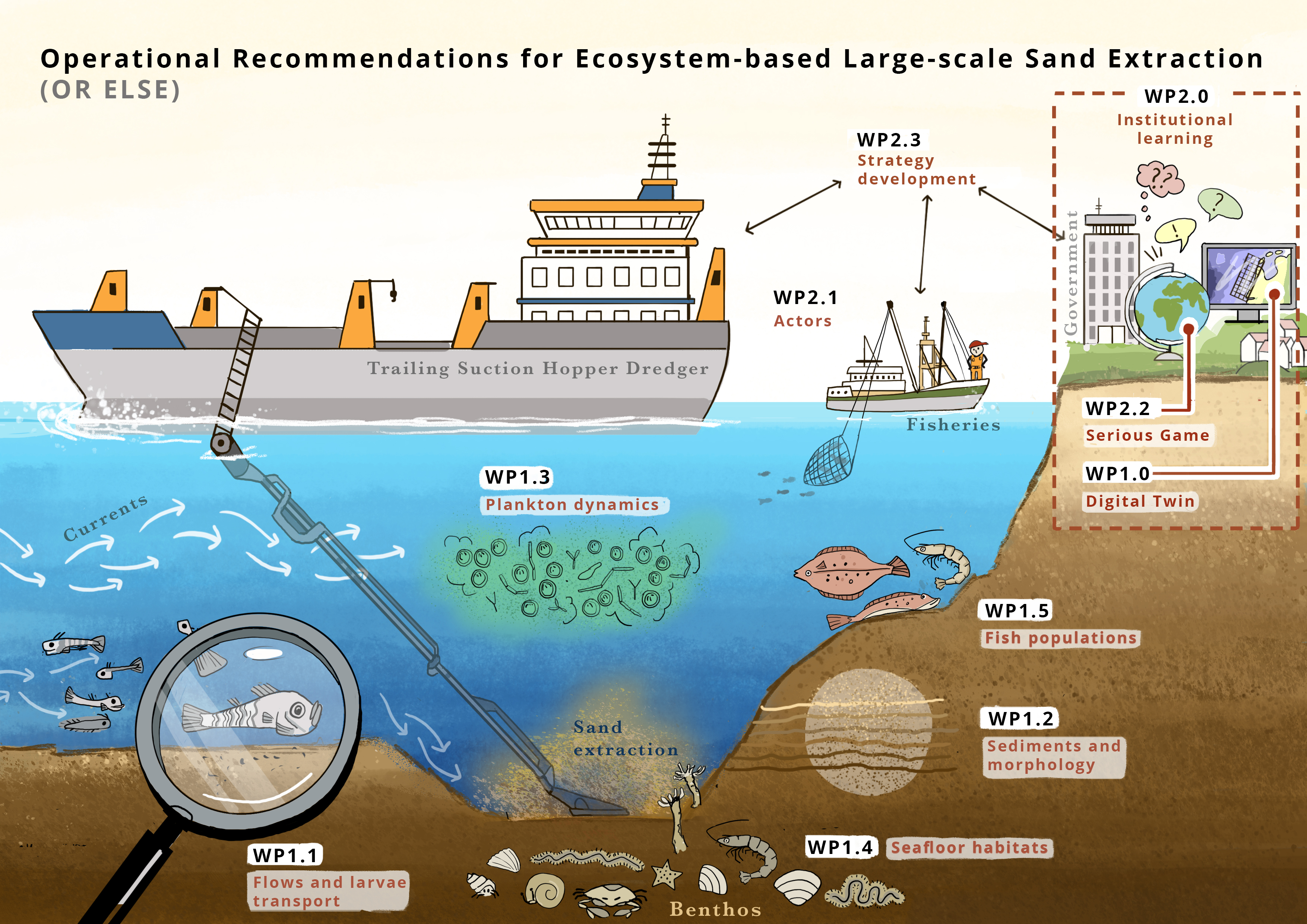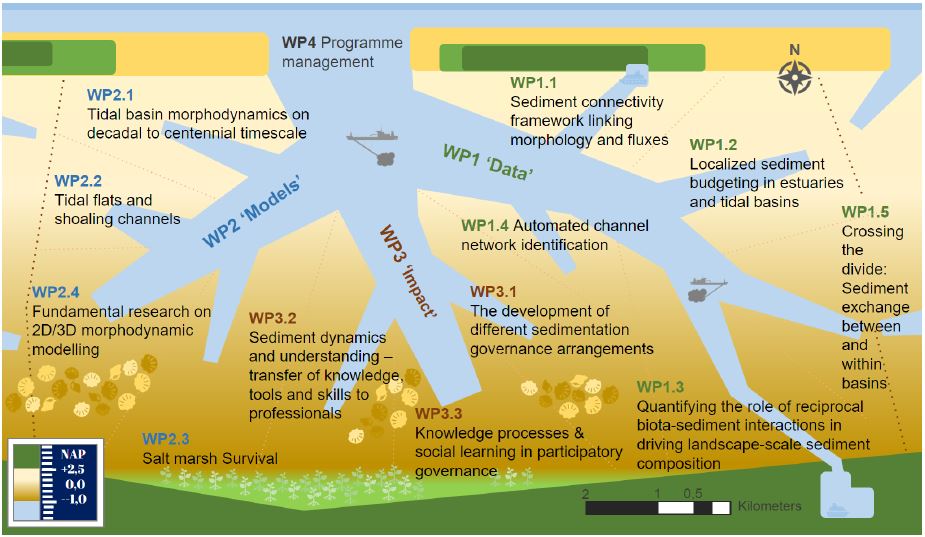On this page we list projects with multiple NCK partners involved.
SOURCE: Sand nOURisment strategies for sustainable Coastal Ecosystems
Duration: 2024-2030
Partners: UT, Deltares, HZ, TUD, UU, VU & WUR & 25 users incl. Rijkswaterstaat
Funding: NWO, NWA.1518.22.133
Website: https://source-research.nl/
Accelerated sea-level rise threatens coastal areas globally. Moreover, housing and socio-economic developments cause increasing pressure on coastal land use. Without adaptation a so-called coastal squeeze will occur with a narrowed beach-dune system. This endangers these systems and puts coastal communities at risk of flooding. The coastal ecosystem’s response combined with human interventions will be critical for the future of our sandy coasts. The SOURCE philosophy is that carefully planned sand nourishments in the present will create the required and desired resilient and dynamic multifunctional coastal landscapes of the future.

SOURCE will deliver the knowledge, models and design tools to develop and evaluate nourishment strategies in a multi-stakeholder co-creation process. This will be accomplished by a unique combination of fundamental coastal ecosystem understanding, reliable predictive modeling, determining the social costs and benefits, and an integral nourishment design and evaluation process. Our Living Labs are two sand nourishments along the Dutch coast. These will be co-designed, monitored and evaluated by the SOURCE researchers and 25 (inter)national partners from government organizations, research institutes, nature organizations and industry.
Delta-ENIGMA
Duration: 2023-2032
Partners: UU, TUD, WUR, NIOZ, Deltares, RWS, UT, IHE, TNO (all NCK partners)
Funding: NWO (Large Scale Research Infrastructure)
Website: www.delta-enigma.nl
Deltas and coastal plains are attractive places to live: fertile, flat, open to the sea. These lowlands are, however, also vulnerable to climate change and sea level rise. To better predict how deltas will develop in the future we need a thorough understanding of how organisms, currents, waves, water and sediment together shape the delta landscape. This so-called biogeomorphology lies at the heart of Δ-ENIGMA. The program provides measurement infrastructure for intensive observational and experimental research of the Dutch Delta. This will improve our ability to predict future development of our delta in times of climate change, to ensure safe and sustainable living for the generations to come.

Delta-ENIGMA forms a crucial element in our strategy to strengthen data-driven science in the field of water management, and it will bring the Netherlands globally in a forefront position regarding research infrastructure for studying biogeomorphological processes in engineered deltas. And it will serve as a basis for the Dutch contribution to the pan-European environmental research infrastructure DANUBIUS-RI.
OR ELSE: Operational Recommendations for Ecosystem-based Large-scale Sand Extraction
Duration: 2022-2028
Partners: WUR, TUD, Deltares, NIOZ, UTwente, Buas, HVHL
Funding: NWO (NWA-ORC)
Website: www.or-else.nl

Sand is the second most extracted natural resource globally, exceeding fossil fuels and biomass. Sand extraction volumes are expected to increase drastically for ever-increasing infrastructure projects and to ensure coastal protection by sand nourishments. Large-scale marine sand extraction has important ecosystem effects through changes in flows and sediments and physical disturbance of benthic habitats, which affect the whole food web and other uses. By extracting large quantities of sand to protect the population against large-scale flooding, the Netherlands faces the challenge to attune to associated ecological and social effects. The objective of this project is to ease this dilemma and to give recommendations for an ecosystem-based large-scale sand extraction approach in the Dutch North Sea, which will also inform and guide stakeholders in sand extraction worldwide.
WadSED
Duration: 2023-2027
Partners: UU, TUD, WUR, NIOZ, Deltares, RWS
Funding: NWO (Perspective)
Website: wadsed.nl
The Wadden Sea and the Ems-Dollard and Western Scheldt estuaries have nationally important navigation channels and globally important ecosystems on tidal flats and coastal wetlands, that also protect the coast against storms. However, dredging costs are escalating, biodiversity is declining, and the sea level is rising. These three threats are magnified by a surplus or deficit of sand and mud, which requires sediment management. The knowledge and tools needed for this pose profound scientific challenges. WadSED will develop the urgently needed system understanding, data analysis tools, and forecasting models for science and expert users, and co-create common ground among stakeholders for future-proof coastal management.
TRAILS: TRacking Ameland Inlet Living Lab Sediment
Duration: 2020-2025
Partners: WUR, NIOZ, TUD, RWS, Deltares
Funding: NWO (TTW)
Website: https://www.wur.nl/trails
Sand nourishment is now the preferred coastal management strategy in the Netherlands to prevent coastal erosion and drowning of intertidal areas of the Wadden Sea. Nourishments aim to enhance safety, while simultaneously promoting natural and recreational values. However, it is poorly understood how nourished sand is dispersed, and what the impacts are for diverse coastal functions like biodiversity, fisheries and safety. In this project, Ameland Inlet is our Living Laboratory to develop and test methods to determine the fate of nourishment sand, and to work with stakeholders to clarify impacts and co-assess nourishment strategies.
SALTIsolutions
Duration: 2020-2026
Partners: UU, TUD, WUR, NIOZ, Deltares, RWS, UT
Funding: NWO (TTW)
Website: https://kbase.ncr-web.org/saltisolutions/
Freshwater is vital for drinking water, nature, agriculture and industry. However, the availability of freshwater is under pressure in deltas throughout the world. Salty seawater is penetrating further up the rivers due to human intervention, such as the deepening of waterways, as equally climate change. Within SALTISolutions, the researchers, together with the partners involved such as Rijkswaterstaat, water boards, port authorities and dredging companies, will produce a virtual model (digital twin) of the Rhine-Meuse Delta. This model will integrate knowledge about processes on various spatial and time scales: from turbulent flows at the smallest scale level to the consequences of climate change in the long-term. They will use this to predict how, where, when, and how long salt from seawater will penetrate, and how measures such as implementing nature-based solutions influence the freshwater supply. These insights will be tested worldwide, as a result of which the position of Dutch delta technology will be further strengthened.
Living Dikes
Duration: 2020-2026
Partners: UT, RWS, Deltares, TUD, NIOZ, UU
Funding: NWO-ORC
Website: https://www.4tu.nl/resilience/news-and-events/news/living-dikes-come-alive/
Living dikes are a promising way to climate‐proof our coast. Living dikes consist of a soft foreland and a green dike. This research facilitates the construction of living dikes by weighing interests, testing living dikes in the field and formulating design rules to be applied by end‐users.











